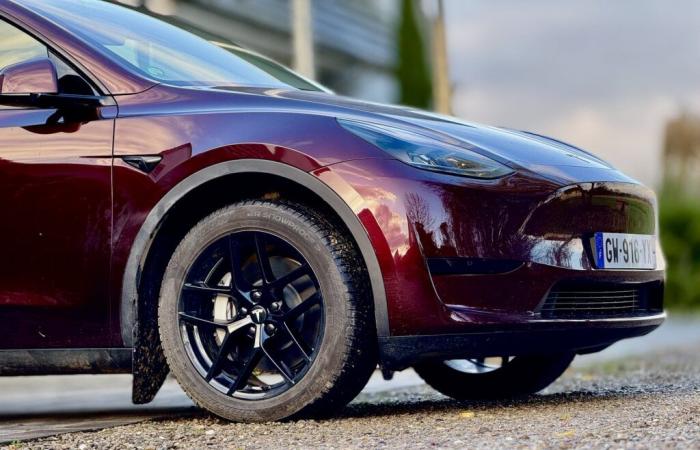Winter tires are essential to ensure safety and performance on cold and slippery roads. Here is a complete guide to choosing the best models for your Tesla Model Y, adapted to your dimensions and priorities.
Between November and March, when temperatures drop below 7°C, summer tires lose their grip and braking capabilities. Winter tires are specially designed to maintain their flexibility and provide better traction on snow, ice and cold roads. Their deep tread evacuates water and snow to reduce the risk of aquaplaning. As well as being a legal requirement in some areas, they offer safer driving.
The impact of winter tires on the range of electric cars
Winter tires, which are softer and more sculpted, slightly increase rolling resistance, which can reduce range by around 10%. In addition, the batteries of electric vehicles like the Tesla Model Y are naturally less efficient in winter, which accentuates the loss of autonomy. Therefore, a suitable driving style and correct tire pressure are essential to limit the impact.
Specific selection criteria for the Tesla Model Y
For the Tesla Model Y, we evaluated these snow tires according to three main criteria: energy efficiency to limit the impact on range, wet grip to guarantee safety, and reduced noise level, ideal for a quiet electric vehicle. The models selected, compatible with the Model Y Propulsion and Long Range, are 255/45 R19 and 255/40 R20, offering an optimal balance between performance and comfort. We also favored premium brands recognized for their reliability. Before purchasing, check the exact dimensions in the front door.
Choosing the best winter tires for Tesla Model Y
Here is our selection of the best winter tires for your Tesla Model Y. This table summarizes their main characteristics according to dimensions.
Hankook Winter I*Cept Evo 3
| Dimension | Consumption | Adhesion | Bruit (dB) |
|---|---|---|---|
| 255/45 R19 | C | B | 73 |
| 255/40 R20 | C | B | 73 |
The Hankook Winter I*Cept Evo 3 offers excellent grip on wet surfaces thanks to its B index. It is optimized for low rolling resistance, thus limiting the loss of autonomy on your Tesla Model Y. Although it is slightly noisy at 73 dB, it remains a balanced choice for demanding winter conditions.
Michelin Alpin 5
| Dimension | Consumption | Adhesion | Bruit (dB) |
|---|---|---|---|
| 255/45 R19 | C | C | 71 |
| 255/40 R20 | C | B | 71 |
The Michelin Alpin 5 winter tire combines excellent energy efficiency and low noise levels. Its grip performance is particularly appreciated in snowy or icy areas. It is also known for its durability, an asset to reduce the frequency of replacement.
Michelin Pilot Alpin 5
| Dimension | Consumption | Adhesion | Bruit (dB) |
|---|---|---|---|
| 255/40 R20 | C | B | 69 |
Ideal for demanding drivers, the Michelin Pilot Alpin 5 guarantees stable and precise driving, even on slippery roads. With a noise of only 69 dB, it perfectly complements the natural silence of the Tesla Model Y.
Nokian Snowproof 2
| Dimension | Consumption | Adhesion | Bruit (dB) |
|---|---|---|---|
| 255/45 R19 | C | B | 73 |
| 255/40 R20 | C | B | 73 |
The Nokian Snowproof 2 is a reliable tire offering excellent safety in winter conditions. Its Nordic design ensures remarkable performance on snow and ice, although noise remains slightly higher than other models.
Nokian Snowproof P
| Dimension | Consumption | Adhesion | Bruit (dB) |
|---|---|---|---|
| 255/45 R19 | B | B | 71 |
The Nokian Snowproof P offers an excellent balance between safety and energy efficiency thanks to its B indices in consumption and grip. Its low noise of 71 dB ensures optimal comfort for trips in Tesla Model Y. Designed to cope with demanding winter conditions, it guarantees reliable grip on slush and good stability at high speed.
Goodyear Ultragrip Performance 3
| Dimension | Consumption | Adhesion | Bruit (dB) |
|---|---|---|---|
| 255/45 R19 | C | B | 71 |
| 255/40 R20 | C | C | 72 |
With reliable grip and a good compromise between comfort and performance, the Goodyear Ultragrip Performance 3 is a great option. Its modern technology guarantees optimal braking, even in the most difficult conditions.
FAQ: Understanding everything about winter tires
Why choose winter tires for my Tesla Model Y?
Winter tires are designed to provide better grip and increased safety on cold, snowy or icy roads. Their special composition allows them to remain flexible when temperatures drop below 7°C, unlike summer tires which become rigid and lose their effectiveness. They also ensure shorter braking distances and reduce the risk of aquaplaning. For the Tesla Model Y, winter tires help maintain performance and ensure safe driving.
Do winter tires reduce the range of the Tesla Model Y?
Yes, winter tires slightly increase rolling resistance, which can reduce the range of your Tesla Model Y by 5 to 10% on average. In winter, this reduction is accentuated by the natural drop in battery performance in cold weather. However, these tires provide optimal safety, and a suitable driving style can partially compensate for this loss of autonomy.
What are the European indices to favor for winter tires?
For the Tesla Model Y, it is advisable to choose tires with a good balance between:
- Consumption (C or B) to preserve autonomy.
- Grip (A or B), guaranteeing optimal performance on wet roads.
- Noise level (in dB), ideally low to match the silence of an electric vehicle.
Are winter tires mandatory for the Tesla Model Y?
In certain regions, notably French mountainous areas subject to the Mountain Law II (November to March), the use of winter tires or chains is compulsory. Even if it is not obligatory everywhere, they are strongly recommended to guarantee your safety on cold or snowy roads.
When should I install my winter tires?
Winter tires should be installed as soon as temperatures regularly drop below 7°C, generally between November and March. It is important to mount them before the first frost to be prepared in case of sudden winter conditions.
What is the average lifespan of winter tires?
Winter tires have an average lifespan of 4 to 5 seasons, or around 30,000 to 40,000 km, depending on your driving style and road conditions. Regular inspections to check their tread depth (legal minimum 1.6 mm, recommended 4 mm) ensure that they are still suitable for winter use.
This content is brought to you by our editors. This article may include affiliate links: the e-merchant may then pay us a commission when purchasing an item. For you, nothing changes. The prices indicated in this article are subject to change.






